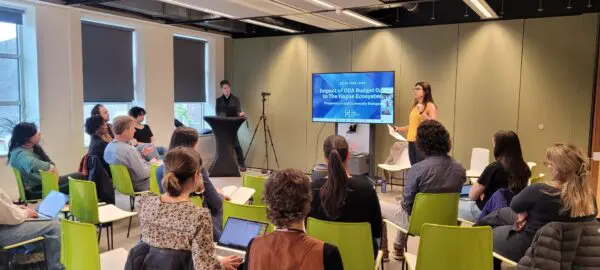New Report Launch & Community Reflections
How is the financial and organisational capacity of organisations active in the peace & justice ecosystem of The Hague impacted by the budget cuts of foreign aid such as the Dutch ODA and other government ODA cuts?
In February 2025, The Hague Humanity Hub and HVFC International—working closely with the City of The Hague—launched a collaborative research project to explore the consequences of recent and anticipated budget cuts to foreign aid. These include reductions in Dutch ODA and similar cuts from other donor governments.
The project set out to better understand the financial and operational impact on organisations working in The Hague’s peace and justice ecosystem. It looks at how the sector is responding to challenges around funding, staffing, programme continuity, and long-term sustainability.

A Mixed-Methods Approach
To ensure a comprehensive picture, the research combined:
- Desk research
- An online survey targeting sector organisations
- In-depth qualitative interviews
Together, these inputs provide critical insights into how organisations are coping with—and adapting to—shifting funding landscapes.
Key Findings at a Glance
- 81% of respondents said their organisation has been affected by ODA cuts.
- 23% expect to lose more than half of their current funding. An additional 37% foresee losses between 25%–50%.
- Around 16% expect to lay off over half of their staff, with 21% expecting staffing reductions of 25%–50%.
- Organisations with international operations—especially larger and mid-sized ones—are among the hardest hit.
- Small and mid-sized organisations are particularly vulnerable due to limited income diversification and lack of reserves.
- Large organisations primarily focus on international development, humanitarian assistance, and rule of law, while mid-sized groups work across a broader mix of areas.
- 41% of small organisations anticipate losing more than half of their annual budgets, though 50% do not expect changes in staffing levels.
Interviews revealed that many are using this disruption to rethink their strategies, including:
- Exploring shared services
- Forming new alliances with private partners
- Increasing domestic engagement and visibility

Alongside the report launch, a community dialogue brought together sector professionals to reflect on the findings and share lived experiences from within their organisations. The discussion highlighted not only the urgency of the challenges ahead, but also the ideas, tensions, and strategies emerging across the field.
Key takeaways from the conversation included:
- A shift in donor priorities—from human rights to security—forcing organisations to reframe their work
- Rising tensions between maintaining values and adapting to new funding conditions
- Increased interest in alternative funding models (e.g. private partnerships, crowdfunding)
- Early discussions around mergers and shared service models as survival strategies
- A push toward localisation and genuine power sharing with local actors
- Strong calls for collective advocacy and better communication about the real-world impact of funding cuts—especially on vulnerable communities
Looking Ahead Together
We hope the findings in this report will serve as a catalyst for reflection and conversation within The Hague and beyond. The goal is not only to understand the challenges but to spark new ideas for collaboration and sustainability across the peace and justice community.
If you have questions or would like to learn more about the project, please contact us at engage@humanityhub.net
